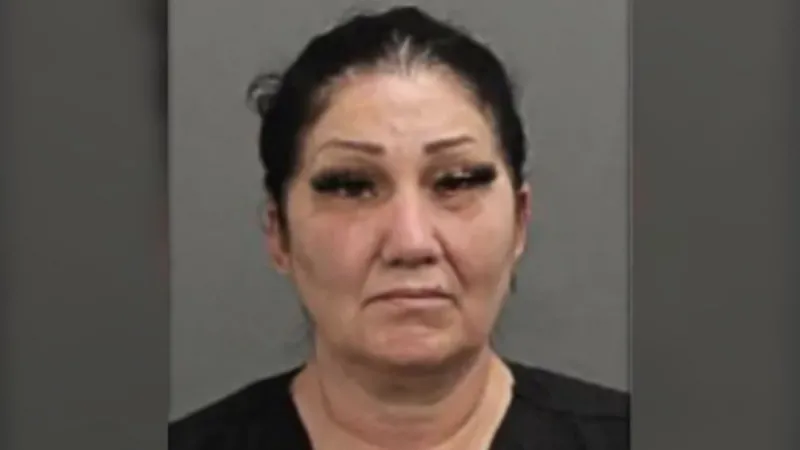Calls for Archbishop of York to resign over Church failings in sex abuse case
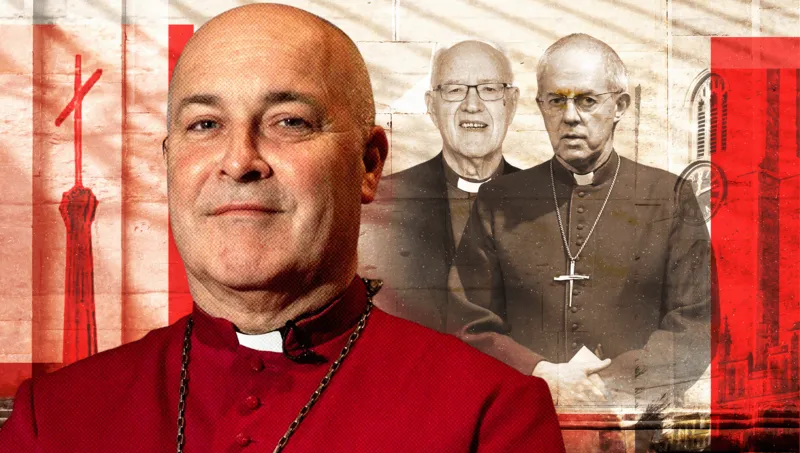
The Archbishop of York Stephen Cottrell is facing calls to resign over his handling of a sexual abuse case, days before he takes temporary charge of the Church of England.
As Bishop of Chelmsford, Mr Cottrell let priest David Tudor remain in post in the diocese despite knowing he had been barred by the Church from being alone with children and had paid compensation to a sexual abuse victim, a BBC investigation reveals.
A spokesperson for Mr Cottrell said he had been in an "invidious situation" and did not have the legal power to sack the priest. Tudor was only banned from ministry two months ago - after he admitted historical sex abuse allegations relating to two girls.
However, the Bishop of Newcastle the Rt Rev Helen-Ann Hartley says Mr Cottrell could have done more and should resign as archbishop.
"It completely undermines his credibility that this case was not acted on," she told BBC File on 4 Investigates.
"How can you have the moral and ethical authority to lead an institution with that?"
A woman who was paid £10,000 compensation by Tudor over claims he sexually abused her as a child says Mr Cottrell's failure to act when he was told about the payment means he should "leave the Church".
"I feel like he [Stephen Cottrell] has spat in my face," says Jessica (not her real name).
The calls for Archbishop Cottrell to resign come at a time of turmoil in the Church of England following a damning report into how it covered up prolific abuse by the barrister John Smyth.
The report led to the resignation of the Church's most senior figure, Archbishop of Canterbury Justin Welby. Mr Cottrell will take over his role temporarily for a few months in the New Year.
The BBC can reveal that Mr Welby and a former Archbishop of Canterbury, George Carey, were also involved in the Tudor case - Mr Welby in 2018 and Lord Carey in 1993.
David Tudor did not respond to the BBC's questions.
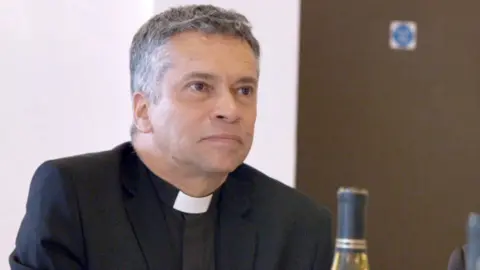
At least seven women say they were abused by Tudor. One received six-figure compensation from the Church in 2019 and others are bringing civil claims.
Tudor worked for the Church of England for over 46 years, in London, Surrey and Essex, rising from curate to honorary canon. He gained a reputation for filling churches with his charismatic preaching.
He was an area dean on Canvey Island in Essex in 2010, when Stephen Cottrell became Bishop of Chelmsford - a position Mr Cottrell held for 10 years before becoming Archbishop of York.
During his first week in office, Mr Cottrell was fully briefed on the "longstanding safeguarding concerns" raised about Tudor, a spokesperson for the Archbishop said.
Mr Cottrell would have been told:
- In 1988, David Tudor was a defendant in two criminal trials
- In the first trial, he was acquitted of indecently assaulting a 15-year-old school girl although he admitted having sex with her when she was 16
- In the second trial, he was convicted of indecently assaulting three girls and was jailed for six months. The conviction was quashed on technical grounds because the judge had misdirected the jury
- In 1989, Tudor was banned for sexual misconduct by a Church tribunal but was allowed to return to ministry after 5 years
- In 2005, Tudor was suspended as police investigated an allegation he had indecently assaulted a child in the 1970s. He was not charged and was allowed back to work under conditions
- From January 2008, Tudor had been working under a safeguarding agreement preventing him from being alone with children or entering schools in Essex - and yet months later he had become an area dean in charge of 12 parishes
Mr Cottrell's office told the BBC that for much of his time as Bishop of Chelmsford he had been unable to take any disciplinary action because there were no complaints that hadn't already been dealt with.
It was not until 2019, when a fresh complaint was made against Tudor leading to a suspension, that there was "an opportunity to remove the risk", said a spokesperson.
But the Bishop of Newcastle, Helen-Ann Hartley, told File on 4 Investigates that had not been an adequate response because "any action that could have been taken" by Mr Cottrell "should have been vastly stronger than simply to try and manage a risk, particularly if the priest in question is already banned from working with children or entering schools".
While Mr Cottrell's office maintains there were no grounds to act until 2019, the BBC can reveal that Mr Cottrell was told in 2012 about the £10,000 payout Tudor had made to Jessica, who says she was sexually abused by him, sometimes very violently, from the age of 11 during the 1970s when Tudor was training to be a minister.
She had brought the claim after police ended an investigation without pressing charges.
"Nobody would make a payment if they haven't got something to hide," says Jessica.
Bishop Hartley says the payout was "completely against the principles of the institution" that Mr Cottrell is supposed to be part of and should have led to disciplinary proceedings against the priest.
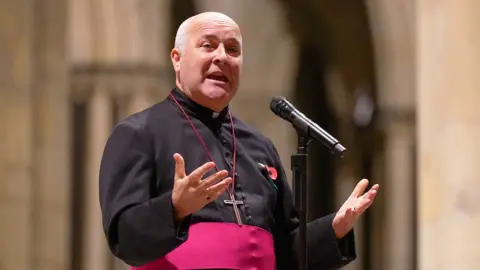 Getty Images
Getty ImagesThe personal payment made by Tudor "admitted no liability" - Mr Cottrell's office told the BBC - adding that the then-Bishop of Chelmsford had been guided by "legal advice" that no further action could be taken.
To compound the hurt felt by those who say they were abused as children by Tudor, three years after making his compensation payment, Tudor became an honorary canon of Chelmsford Cathedral.
Such an appointment was "just horrendous" says Jessica.
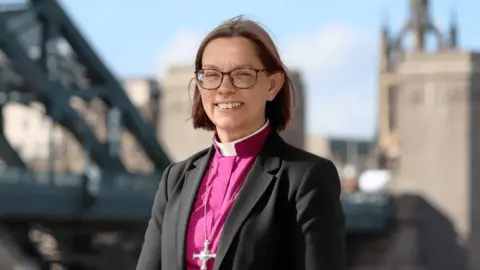 Diocese of Newcastle
Diocese of NewcastleDavid Tudor's elevation to honorary canon is something Stephen Cottrell "regrets", says his office, but it was "not a promotion and not a personal reward".
"It happened because of a change in Church policy during the bishop's time in office, meaning area deans were automatically made honorary canons."
But that is "ludicrous" says Bishop of Newcastle Helen-Ann Hartley and "simply not good enough".
"You are absolutely uplifting somebody's ministry as an example and a model of good and best practice, and you're celebrating that actually by making them an honorary canon."
Rt Rev Hartley has been a lone voice in the upper echelons of the Church of England, criticising the institution's failure to deal with abuse and to listen to victims. Last month, she became the only senior serving cleric to call for Justin Welby to step down.
Now, she says, Stephen Cottrell should follow.
The BBC's investigation into the David Tudor case also reveals roles played by others at the very top of the Church of England over several decades - including former Archbishop of Canterbury, George Carey.
Debbie (not her real name) says between the ages of 13 and 15 she was sexually abused by Tudor when he was a vicar and school chaplain in Redhill, Surrey. She was one of the three girls in his second trial in 1988. Tudor was found guilty, but the conviction was later quashed.
It has had "a huge effect" on Debbie's life, she says, leaving her with complex post-traumatic stress disorder (PTSD), which she says has been made worse by the Church's handling of the case since.
"It's absolutely disgusting that they supported him, that they welcomed him back into the Church," she says.
Tudor's return to the priesthood was assisted by then-Archbishop of Canterbury George Carey.
In 1993, the archbishop - now Lord Carey - agreed that Tudor could come back under supervision the following year. This was done "with some trepidation", the Church of England told the BBC.
Leaked documents seen by File on 4 Investigates also show that Lord Carey agreed, in 1996, to remove the priest's name from a centrally-held record of clergy who had been subject to disciplinary proceedings.
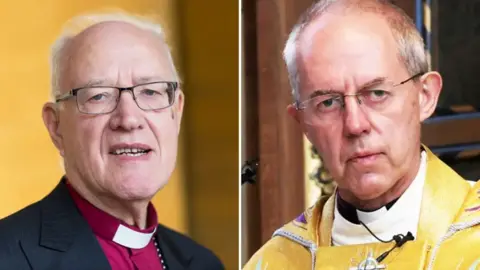 Getty Images
Getty ImagesLord Carey said he does not remember David Tudor's name. The Church of England said the request was made by the then-Bishop of Southwark Roy Williamson, who died in 2019, and Lord Carey had agreed to it.
"We recognise these procedures were neither sufficient nor survivor-focussed, and that very different decisions would have been made today," Southwark diocese told the BBC.
"The decision not to impose a lifetime ban on David Tudor seems absolutely inexcusable in today's context and would not have been made today."
The Tudor case also came across the desk of the current Archbishop of Canterbury Justin Welby in 2018, when Rev Jenny Penn wrote to his office questioning why the priest was still in post.
She had been a member of a "core group" of Church safeguarding advisers, and national and local clergy, asked to look into Tudor because another of his alleged victims involved in the 1988 trials had issued a claim for compensation - this time from the Church, rather than Tudor personally.
The woman would later win a six-figure Church payout and an apology.
Archbishop Welby had recently told all clergy that it wasn't enough to say sorry about past abuse - and that they should "take action that demonstrates clearly that we have learnt the lessons".
In her letter to him, Rev Penn said she was "struggling with the disconnect between the words and the practice".
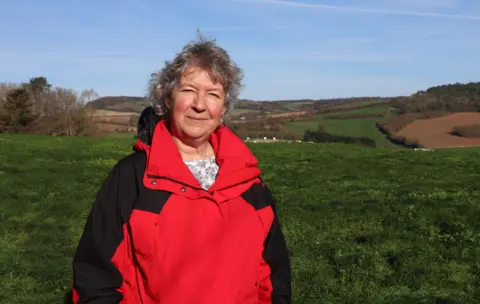 Steve Swann / BBC
Steve Swann / BBCShe received a response saying the matter had been reviewed. Rev Penn wrote again, and was again told "the matters raised have been dealt with".
She says she was "fobbed off".
"To me it was quite clear cut that this person shouldn't be in post but [Mr Welby's office] couldn't provide a satisfactory answer as to why he was."
The Church of England told the BBC Archbishop Welby "took seriously the correspondence from this cleric about David Tudor's permission to officiate" and referred her concerns to the Bishop at Lambeth who was responsible for safeguarding.
A reply to a third letter from Rev Penn to Mr Welby's office came from the Bishop of Lambeth's provincial safeguarding adviser and suggested matters raised had been dealt with.
Rev Penn alerted the BBC to the Tudor case after reading our story about the Church paying off a Blackburn Cathedral priest assessed as a potential risk to children.
"I was shocked once more, and angry, that similar things had happened in another place. Old sins cast very long shadows," she says.
Stephen Cottrell's spokesperson said the Archbishop of York "completely shares and understands the hurt and frustrations that surround this case, which were frustrations and anxieties that he lived with every day he was in office".
The Church of England said the BBC File on 4 investigation "reveals a catalogue of past safeguarding decisions, that allowed someone considered a risk in the 1980s to return to ministry in the 1990s".
"This should never have happened," it added.
Among Tudor's victims, there is relief that he is no longer in a position of power after he admitted sexual misconduct at a Church tribunal in October this year and was banned for life from ministry.
"He should never have been let back into the Church in the first place," says Jessica.
Debbie had to move away from her hometown "to a life where nobody knew anything about my past". Holding back tears, she says she has "lived with shame for 40 years".
"It felt like he was protected. It was just so wrong."
Source: BBC
















































